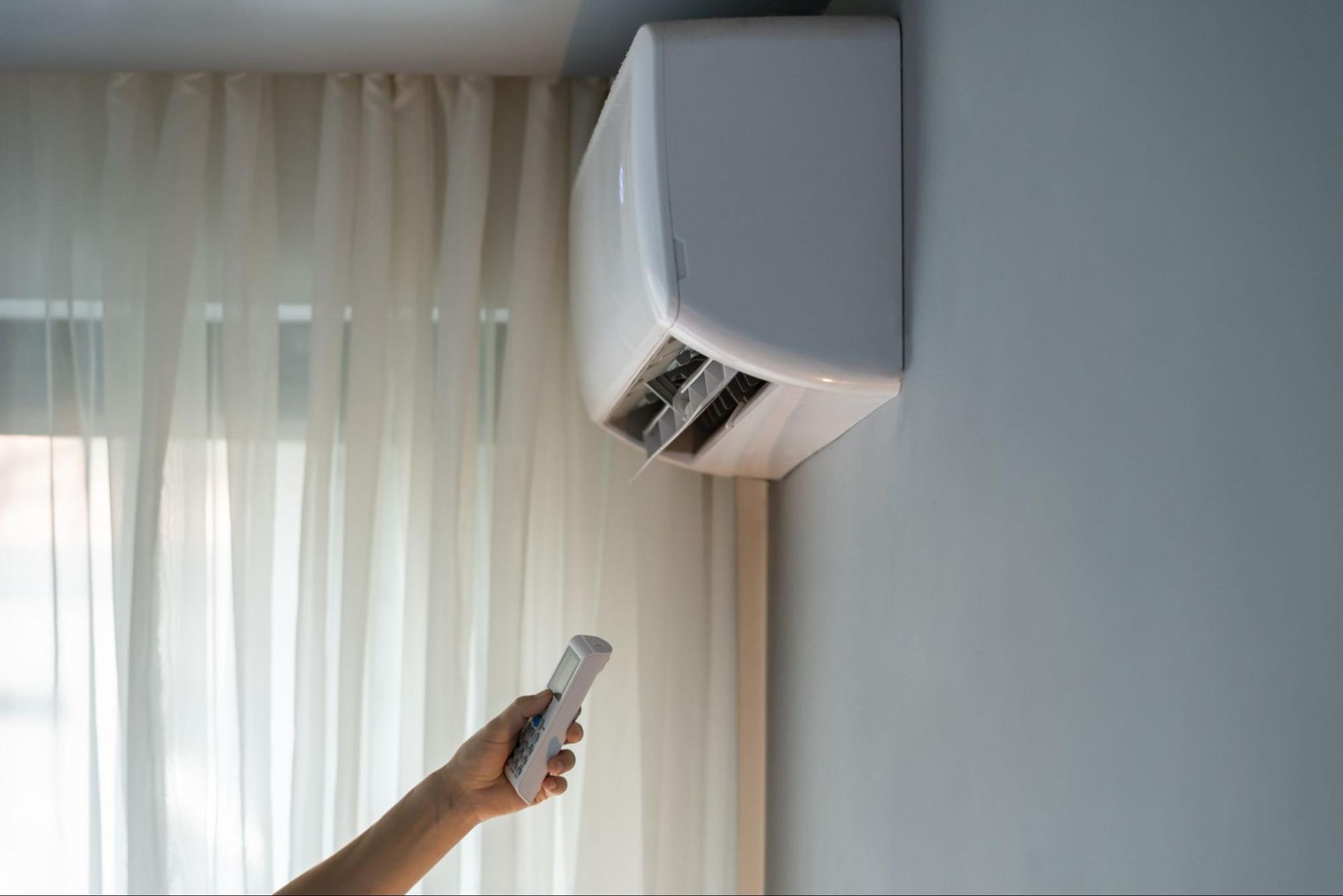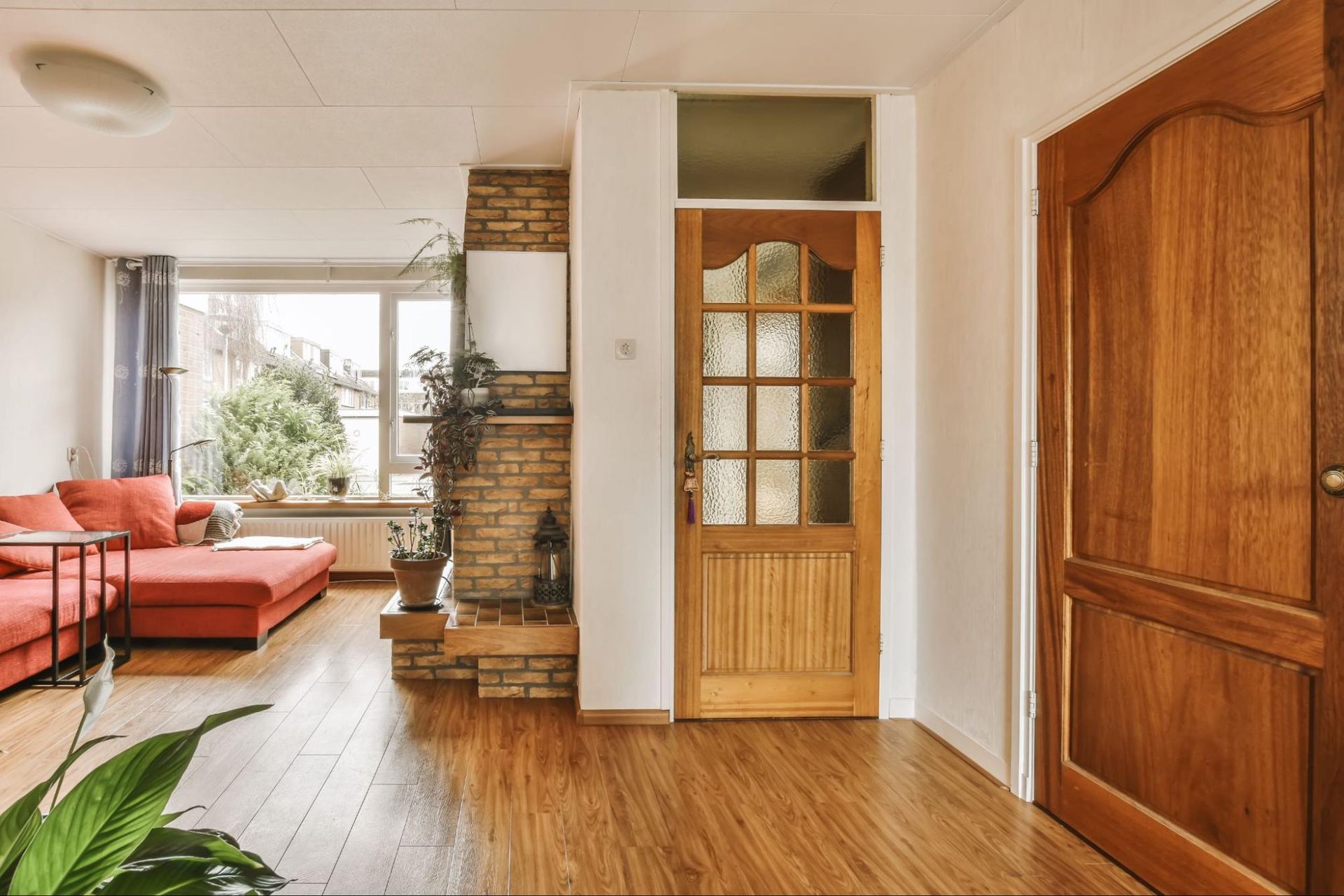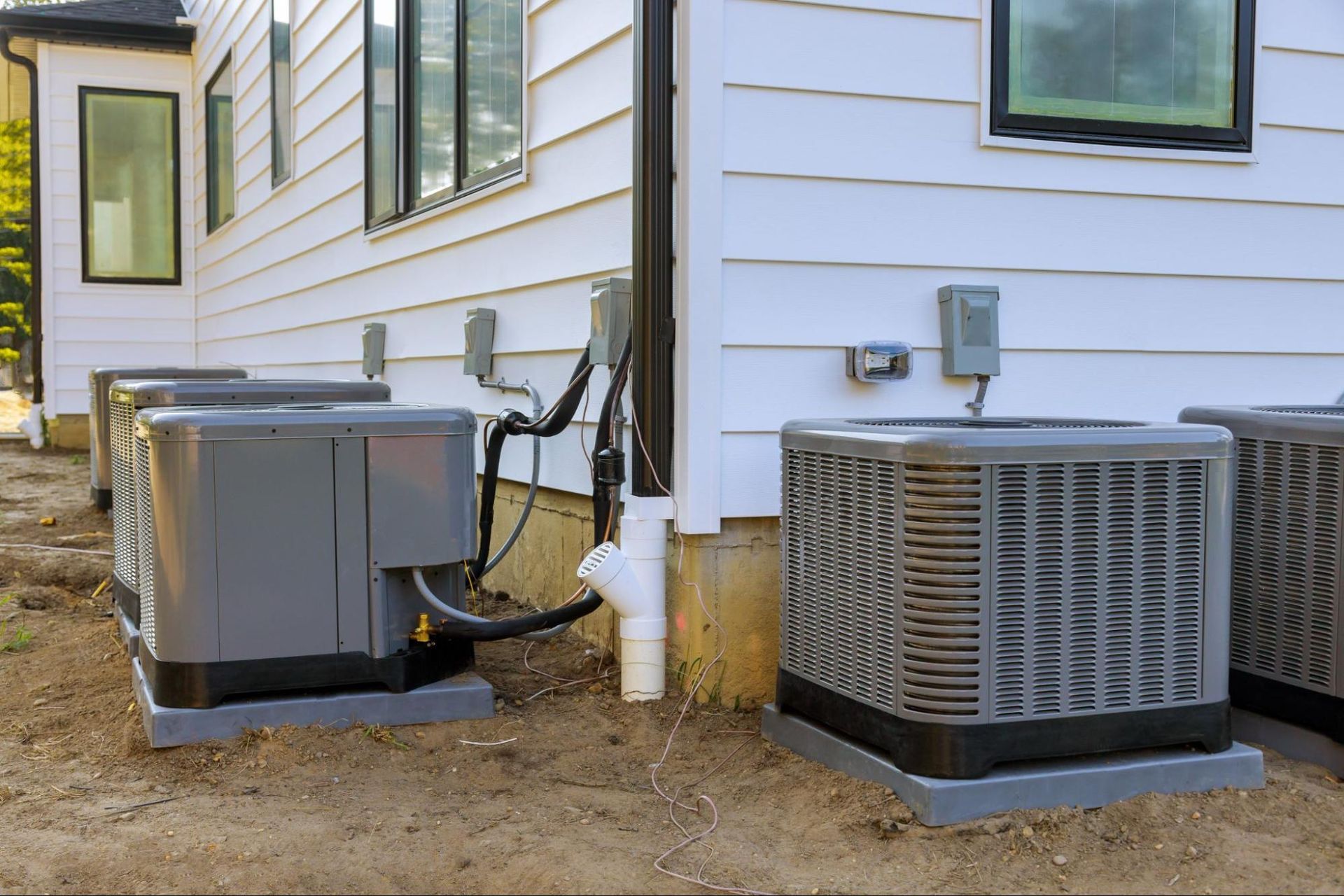Pasadena, TX Home Inspections: Finding the Right Fit for Your Needs
When you're in Pasadena TX and searching for a reliable home inspection service, the right choice can give you peace of mind about your property's safety and value. Home inspection Pasadena TX is more than a simple walkthrough; it is a critical step in maintaining your investment and ensuring compliance with safety and accessibility standards.
For those looking to buy, sell, or maintain a property in the Greater Houston area, including Pasadena, enlisting the services of experts like Accurate Home and Commercial Services is essential. Here's what you need to know about why you should prioritize this service:
- Safety Assurance: Identifies and mitigates potential safety hazards.
- Property Value Protection: Helps in assessing the structural integrity and worth of your home.
- Comprehensive Evaluation: Covers all major systems, including electrical, plumbing, and HVAC.
- Peace of Mind: Ensures your investment is safe and sound for years to come.
Accurate Home and Commercial Services operates across several locations, including Pasadena, Clear Lake, and beyond, providing up-to-date home and commercial inspections. Their expertise involves using industrial-grade tools and advanced inspection techniques to give property owners precise insights into their home's condition.
In choosing Accurate, you partner with a team dedicated to thoroughness and clear reporting, ensuring you have the information needed to make informed decisions about your property.
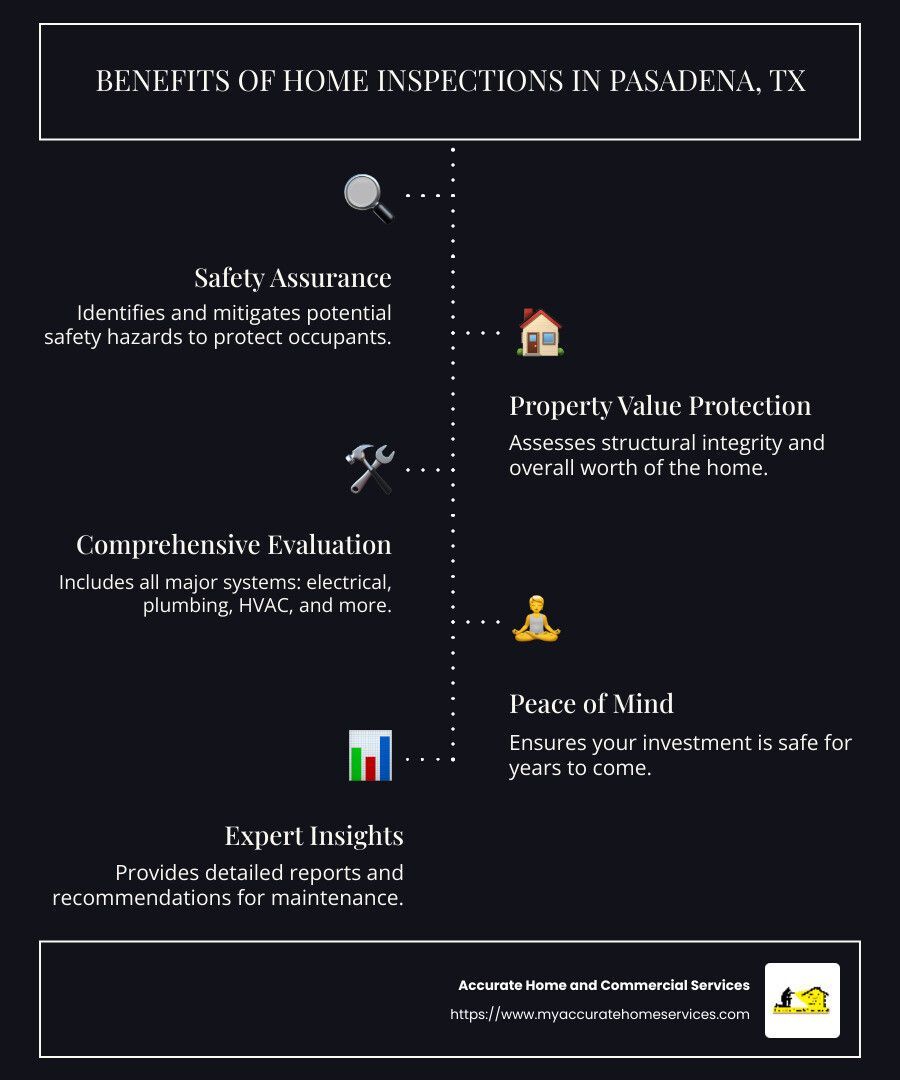
Importance of Home Inspections
When considering a home inspection in Pasadena, TX, it's crucial to understand its role in safeguarding your investment. Home inspections are not just about checking off a list—they're about ensuring the structural integrity, safety, and value of your property.
Structural Integrity
A key aspect of any home inspection is assessing the structural integrity of the property. This involves examining the foundation, walls, roof, and other essential components for any signs of damage or wear. For example, cracks in the foundation or walls might indicate underlying issues that could lead to costly repairs if left unaddressed.
Inspectors also look for signs of moisture penetration, which can compromise the building's structure over time. A thorough inspection can help identify these problems early, allowing homeowners to address them before they escalate.
Safety Standards
Safety is paramount in any home inspection. Inspectors evaluate various safety elements, including electrical systems, plumbing, and HVAC systems, to ensure they comply with current standards. Faulty electrical wiring or outdated systems can pose serious hazards, such as fires or water damage.
Moreover, inspectors check for fire stopping in attics and around chimneys, which is critical for preventing the spread of fires. They also ensure that features like smoke detectors and carbon monoxide alarms are present and functional, providing an added layer of security for homeowners.
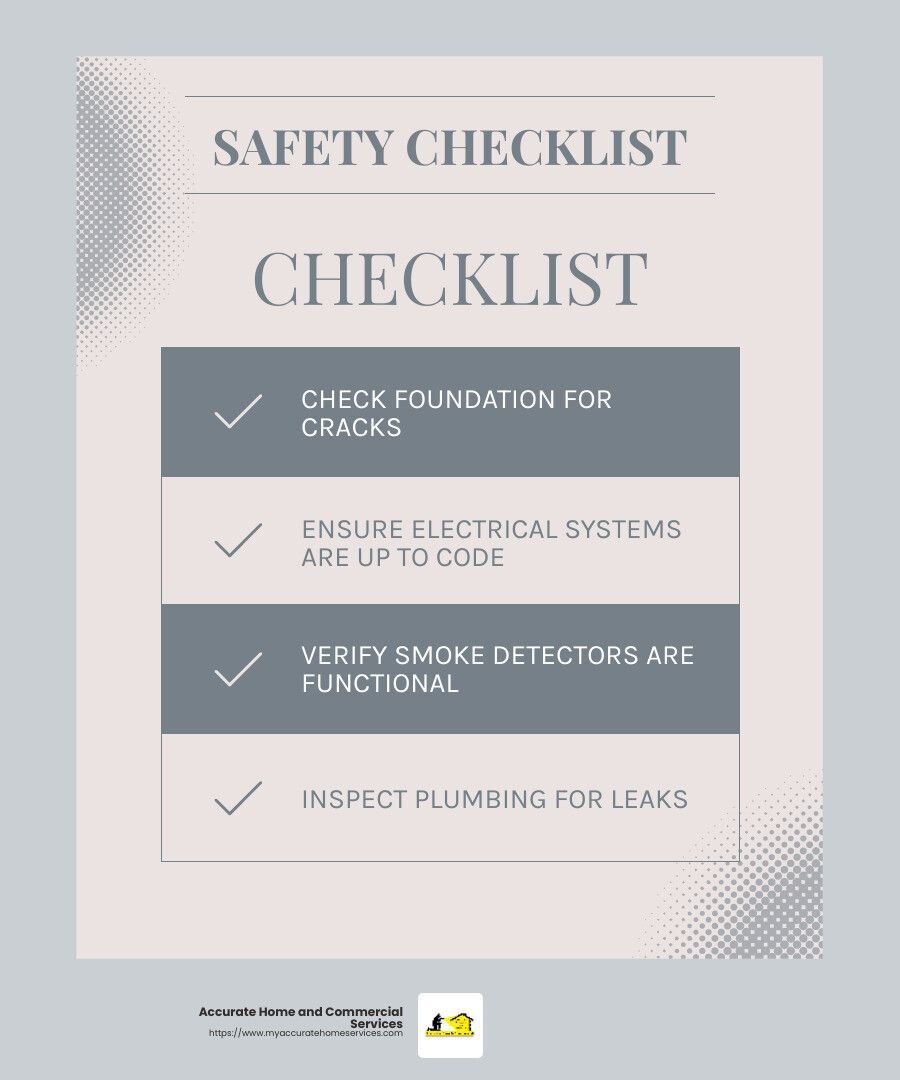
Property Value
Finally, a comprehensive home inspection can significantly impact your property's value. By identifying potential issues and necessary repairs, you can negotiate better terms during a sale or purchase. A well-maintained home with a clean inspection report can attract more buyers and potentially lead to a higher selling price.
For homeowners, regular inspections help maintain the property's value over time. By keeping up with necessary repairs and improvements, you ensure that your home remains a valuable asset.
Understanding the importance of home inspections in Pasadena, TX can help you make informed decisions about your property. Whether you're buying, selling, or simply maintaining your home, investing in a thorough inspection is a wise choice. Next, let's explore the range of comprehensive home inspection services available to you.
Comprehensive Home Inspection Services
When it comes to home inspection in Pasadena, TX, it's important to know what services are available to ensure your property is in top condition. Accurate Home and Commercial Services offers a range of inspection options to cover every aspect of your home. Here's what you can expect:
Thermal Imaging
Thermal imaging is a powerful tool used during inspections to identify issues that are not visible to the naked eye. This technology can detect temperature variations in walls, ceilings, and floors, helping to spot hidden leaks, electrical hotspots, or missing insulation. Using thermal imaging can save homeowners from unexpected repairs by catching problems early.
Electrical Systems
A home's electrical system is critical to its safety and functionality. Inspectors examine everything from service entrance cables to branch circuits. They look for common issues like improperly spliced wires, missing faceplates, and outdated aluminum wiring. Ensuring that Ground Fault Circuit Interrupters (G.F.C.I.) are present in necessary areas like bathrooms and kitchens is also crucial.
Plumbing Systems
Inspecting the plumbing system involves checking all visible water supply lines, waste pipes, and fixtures. Inspectors test for leaks, proper drainage, and adequate water pressure. They also ensure that anti-siphon devices are in place to prevent contamination of the water supply. Identifying these issues early can prevent costly water damage and maintain the home's value.
HVAC
Heating, Ventilation, and Air Conditioning systems are essential for comfort and energy efficiency. Inspectors assess the condition of HVAC units, checking for proper installation and maintenance. They use industrial-grade infrared thermometers to measure temperature output and ensure the system is heating and cooling efficiently. Regular HVAC inspections can help reduce energy costs and improve air quality.
Roofing
The roof is one of the most critical components of a home, protecting it from the elements. Inspectors check for signs of water penetration, damaged shingles, and proper installation. They also look for any structural issues that could affect the roof's integrity. Keeping the roof in good condition is vital for preventing leaks and extending its lifespan.
Grading and Drainage
Proper grading and drainage are essential for preventing foundation problems. Inspectors observe the property's slope to ensure water is directed away from the structure. Poor drainage can lead to water pooling and foundation settlement, which can be expensive to repair. By addressing grading and drainage issues, homeowners can protect their investment and avoid future headaches.
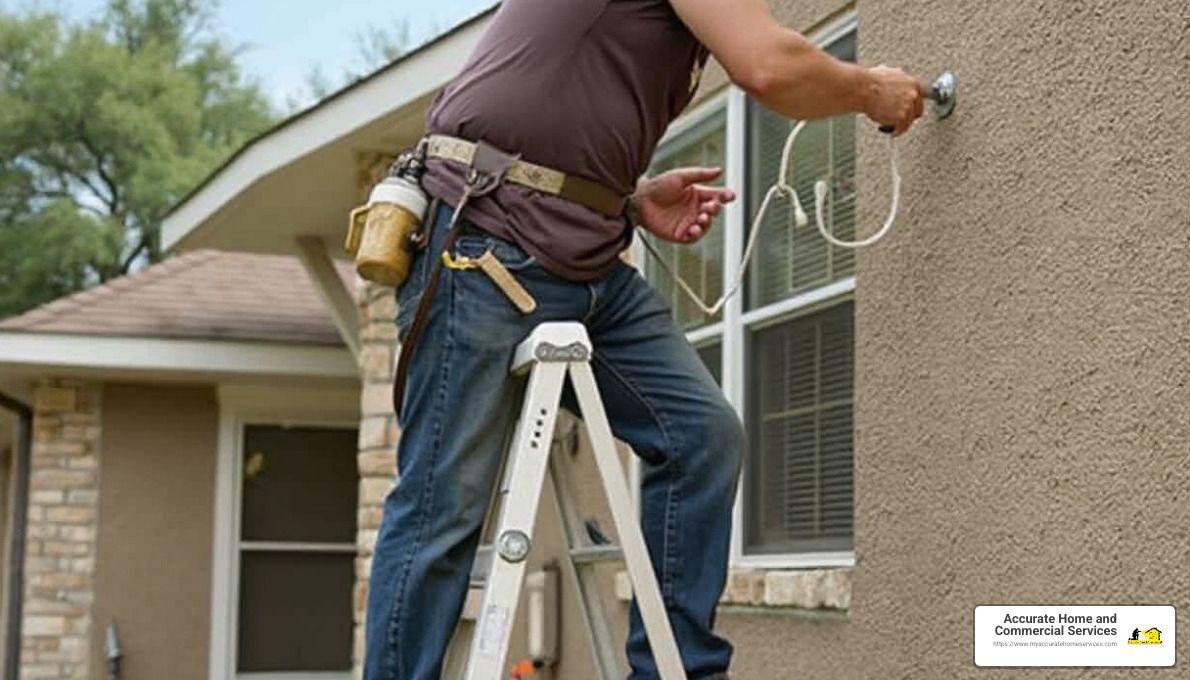
These comprehensive home inspection services provide a thorough evaluation of your property's condition. By identifying potential issues early, you can make informed decisions and maintain your home's safety and value. Next, we'll look at the costs associated with home inspections in Pasadena, TX.
Home Inspection Costs in Pasadena, TX
Understanding the costs of a home inspection in Pasadena, TX is crucial for both buyers and sellers. The price can vary based on several factors, including the size of the home and the complexity of the inspection.
Average Cost
In Pasadena, TX, the average cost of a home inspection ranges from $300 to $500. This price typically covers a standard inspection of a medium-sized home, around 1,500 to 2,000 square feet.
Home Size
Home size plays a significant role in determining the cost of an inspection. Larger homes require more time and effort to inspect, which increases the overall cost. For instance, a home over 3,000 square feet might see inspection costs rise above $500.
Pricing Factors
Several factors influence the cost of a home inspection:
- Complexity of the Inspection: Additional services like thermal imaging or specialized inspections for pests or mold can add to the cost.
- Age of the Home: Older homes may require more extensive inspections due to potential issues with outdated systems or materials.
- Location and Accessibility: Homes in difficult-to-reach areas or those with challenging access points may incur additional charges.
- Additional Systems: If a property has extra features like a pool, well water system, or advanced HVAC systems, these may require specialized inspection, adding to the cost.
By considering these factors, homeowners can better estimate the cost of a home inspection and plan accordingly. In the next section, we'll explore common red flags to watch out for during a home inspection.
Common Red Flags in Home Inspections
When it comes to home inspection in Pasadena, TX, identifying potential red flags is crucial. These issues can threaten the safety, stability, and value of a property. Below, we'll highlight some common red flags that inspectors often encounter.
Structural Elements
Structural issues are among the most serious concerns during a home inspection. Cracks in the foundation, especially horizontal ones with bulges, can indicate significant problems. These cracks can arise from poor construction, natural disasters, or the settling of a home's foundation over time.
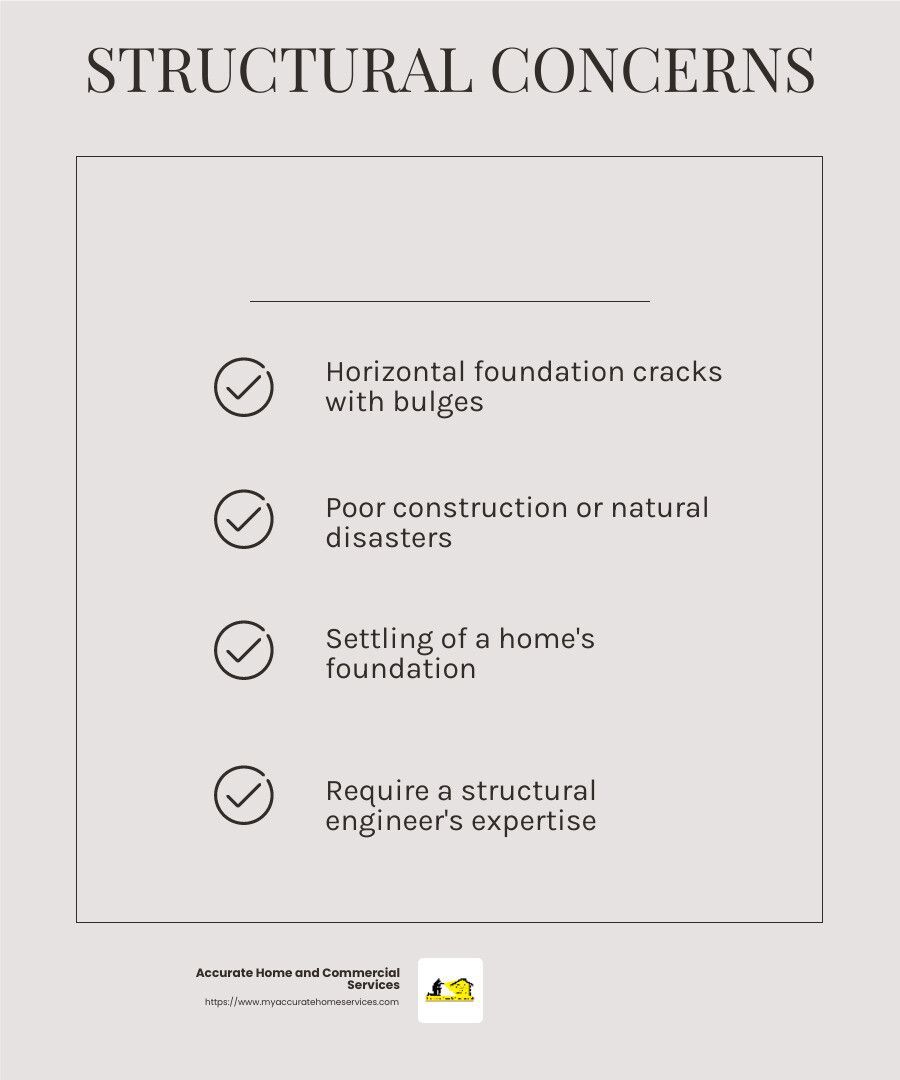
Ignoring such issues can lead to costly repairs or even structural failure. Solutions often require a structural engineer's expertise to assess and address the damage.
Water Damage
Water damage can be a silent destroyer. It often manifests as stains on ceilings, walls, or floors. Inspectors use moisture meters to determine if leaks are active. Left unattended, water damage can lead to mold growth and structural deterioration.
In Pasadena, TX, water penetration is a common issue, especially in older homes. Regular maintenance and prompt repairs are essential to prevent long-term damage.
Termite Damage
Termites can cause extensive damage before homeowners even realize there's a problem. During an inspection, professionals look for evidence of insect infestation, such as damaged wood or mud tubes.
Termite damage can undermine the structural integrity of a home. Regular inspections and treatments are key to preventing these pests from causing significant harm.
Electrical Issues
Electrical problems are major red flags, especially in homes built before the 1970s. Outdated wiring, like aluminum wiring, poses fire risks. Inspectors check for outdated electrical panels, overloaded circuits, and missing safety devices like GFCIs.
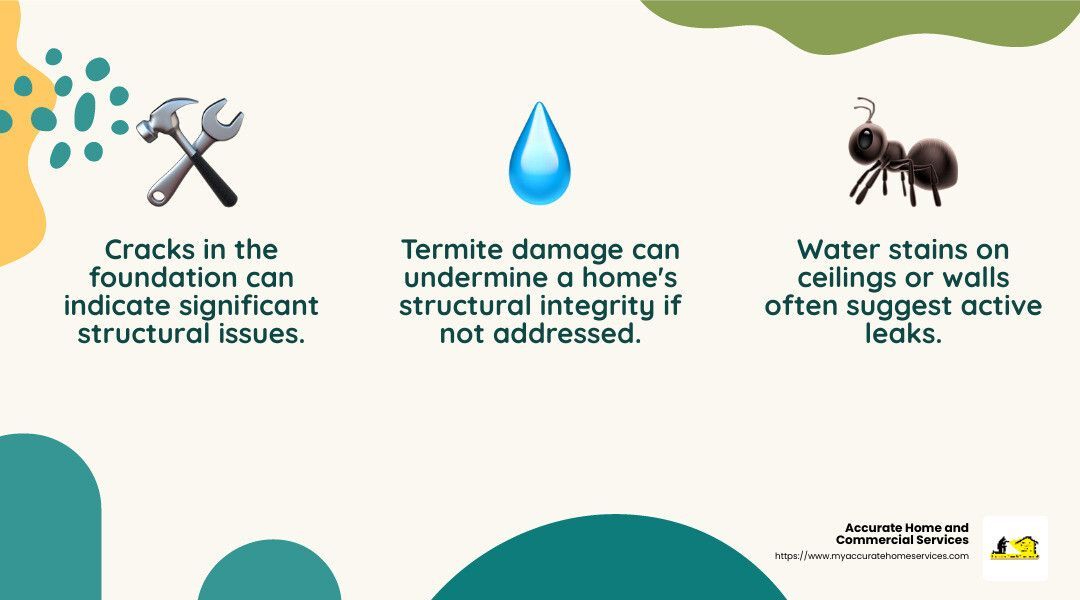
Consulting a licensed electrician can help address these issues, ensuring the home's electrical system is safe and efficient.
By understanding these common red flags, homeowners and buyers can better prepare for a home inspection in Pasadena, TX. In the next section, we'll answer frequently asked questions about home inspections in the area.
Frequently Asked Questions about Home Inspections in Pasadena, TX
How much should a home inspection cost in Texas?
The cost of a home inspection in Texas can vary based on several factors. On average, you can expect to pay between $300 and $500. However, the price can go higher if the property is large or has complex features. For instance, a sprawling estate with multiple structures will require more time and effort to inspect thoroughly.
Home size is a significant factor in determining the cost. Larger homes have more rooms and systems to evaluate, which can increase the inspection duration and, consequently, the cost. It's essential to consider these aspects when budgeting for a home inspection in Pasadena, TX.
What is the biggest red flag in a home inspection?
Structural issues are often the most significant red flags during a home inspection. Cracks in the foundation, especially horizontal ones, can signal severe problems. These issues can compromise the home's stability and safety. It's crucial to address them promptly to avoid costly repairs down the line.
Water damage is another major concern. It might appear as stains or discoloration on ceilings and walls. Left unchecked, water damage can lead to mold growth and further structural deterioration. Inspectors use tools like moisture meters to detect hidden leaks, ensuring a thorough evaluation.
What does a house need to pass inspection in Texas?
To pass a home inspection in Texas, a property needs to meet specific criteria that ensure safety and functionality. Structural integrity is paramount; walls, roofs, and foundations must be sound. The electrical system should comply with current safety standards, with no outdated wiring or overloaded circuits.
Plumbing systems must be free of leaks, and water flow should be consistent across all fixtures. Additionally, the HVAC system should be operational, providing adequate heating and cooling.
Buyers are particularly interested in these aspects, as they directly affect the home's value and livability. A thorough home inspection helps buyers make informed decisions by highlighting areas that may require attention or negotiation before purchase.
Conclusion
Choosing the right home inspection service is crucial for ensuring the safety and value of your property. Accurate Home and Commercial Services stands out in Pasadena, TX, with its commitment to thorough inspections and customer satisfaction. Their detailed approach covers everything from structural integrity to pest control, providing peace of mind to property owners and buyers alike.
Customer satisfaction is at the heart of Accurate Home and Commercial Services. Their experienced team, led by Larry Fleming, emphasizes clear communication and transparency. This ensures that clients fully understand the inspection results and can make informed decisions about their properties.
Safety is another top priority. By identifying potential hazards early, Accurate Home and Commercial Services helps prevent costly repairs and maintains the property's value. Their use of advanced tools and techniques, like thermal imaging, ensures that no issue goes unnoticed.
For those considering a home inspection in Pasadena, TX, Accurate Home and Commercial Services offers a reliable and comprehensive solution. Their expertise and dedication to quality make them a trusted partner in safeguarding your investment.




